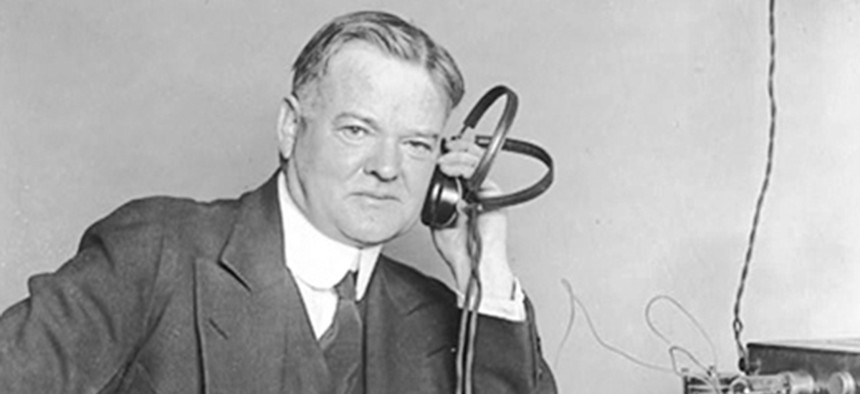
Herbert Hoover Commerce Department
Why Obama’s Post-Presidential Role Model Could be Herbert Hoover
President shows some interest in tackling government reform after he leaves office.
Earlier this week, the New York Times reported on President Obama’s burgeoning effort to determine exactly what to do after he leaves the Oval Office for the last time in January 2017. It involves holding several dinners in recent months with business executives, thinkers, and those who might be interested in making financial contributions toward the creation of an Obama presidential library.
The piece contained this tidbit:
At a dinner this year at Spruce, a restaurant in the Presidio Heights neighborhood of San Francisco, Mr. Obama urged technology executives to focus their philanthropic efforts on helping government become more efficient, giving some the impression that the topic would most likely be a theme of his agenda after leaving office.
In addition, the Times reported that at a dinner at the White House in February, also attended by tech executives,“the president told the group that he wanted to focus on civic engagement and opportunities for youths, pushing guests for ideas about how to make government work better…”
Those aren't the only times lately that Obama has shown interest in the issue of government’s performance. In an interview with Fast Company magazine in June, the president talked about efforts to “yank” an “ossified” and “stuck” federal bureaucracy into the 21st century, largely through upgrading its IT systems and practices.
Of course, one could argue that Obama wouldn’t have to think about stressing this issue in his post-presidential years had he devoted more political capital to it during his time in office. But he told Fast Company he was too busy solving the economic crisis, saving the American auto industry and trying to wind down two overseas wars to focus on operational issues -- right up until the Healthcare.gov launch snafu made clear how important they were to a functioning government.
Let’s suppose that Obama decides his post-presidency provides an opportunity to focus on government reform and improvement. How would he go about it? He might have an unusual role model in that regard: Herbert Hoover.
After losing to Franklin Roosevelt in the 1932 presidential election, Hoover largely withdrew from public life (although he harbored dreams of winning the Republican nomination to take on Roosevelt again in 1936 and 1940). But in 1947, after Truman had succeeded Roosevelt, Hoover reemerged in a most unlikely way: as head of the Commission on Organization of the Executive Branch of Government, which became more commonly known as the Hoover Commission.
Hoover’s appointment by Harry S. Truman to the post was, according to a Truman Library Institute newsletter, “viewed by many as a highly unlikely, even strange, choice.” But it turned out to be a shrewd one. Hoover and the commission took their work very seriously, making a raft of proposals for overhauling and trimming federal operations. More than half of the panel’s recommendations ultimately were adopted, leading to the biggest overhaul of federal government operations in American history.
“While the commission was established by conservative Republicans as an anti-New Deal operation, the Truman-Hoover partnership had been responsible for directing its focus on making the existing structure work better,” wrote historian William E. Pemberton in the Truman Library newsletter.
In 1953, President Eisenhower appointed Hoover to lead a second commission, focusing more on procedural and policy issues. It too, resulted in significant reforms.
So could Obama have a similar experience? It’s not out of the question that a Republican president would see the value in appointing a bipartisan Obama Commission (or maybe a truly bipartisan Obama-Bush Commission, headed by the two most recent presidents) to take on the dirty work of government reform. (It’s harder in today’s political climate to imagine that an Obama-led panel appointed by a Democratic president would get much traction.)
A contemporary Hoover-like commission wouldn’t have to focus on reorganizing government, of course. Indeed, given the indifference of lawmakers in recent years to organizational issues, that kind of effort would probably be doomed to oblivion. But a former president could theoretically lead a bipartisan effort to make the kind of changes to civil service rules, procurement regulations, technology policies and other forms of administration that would usher in a more modern, efficient, effective federal government.
The question is, would Obama be willing to make the long-term commitment needed to assure that such an effort would be successful--and willing to navigate the tricky political waters around it? If so, things could get very interesting in government during the next administration.







